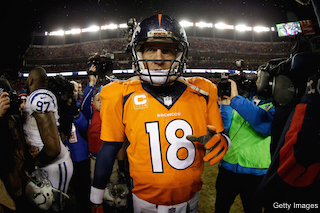The struggles of Denver quarterback Peyton Manning in Sunday’s loss to the Colts revives the classic question: Why don't professional athletes retire as their skills diminish? NFL players can’t seem to quit when it is right, nor can athletes in any other sport.
The classiest exit -- winning the critical game and going out with that as the last memory -- seems impossible for most athletes. Even those athletes with lifetime financial security, rewarding family lives, exciting second career possibilities can rarely do it.
I have worked with some of the most talented athletes in pro sports for 40 years. They are bright and realistic on every other issue except retirement. Most pro athletes play until they are too injured to compete and there is no team that is willing to sign them. At the culmination of an exhausting season, fresh off the aches and pains and disappointments, many athletes contemplate retirement. But as spring training or training camp beckons many months later, they cannot bear to not play.
This is a peer group that generally has played sports since youth. From Little League and Pop Warner, these gifted athletes have become accustomed to the structure and rhythm of training and competing. Athletes love the structured time that athletics provides. Without it, they can become lost, if it is all they ever have known. This peer group loves competition and the adrenaline rush that comes from the play of the game. They become accustomed to defining their worth on the playing field. Long term health and second career are an abstraction.
There is a magical quality to being part of a team, watching their teammates back and being supported in the same way. The camaraderie and joking that takes place in the locker room is a treasured aspect of their lives.
When their skill and physical shape start to diminish, an element of denial kicks in. If the last season did not end on a positive note -- they are like gamblers doubling down to win what they have lost. They are by nature optimistic, and believe in themselves, and know if they are just given another chance, things will work out.
The hardest part of an agent’s job is counseling players facing a retirement decision. The agent, along with loving family and friends, walk a tightrope. No prideful athlete wants to be forced into this decision. If the athlete perceives that those closest have somehow lost belief in his skills, it can make the process more difficult. It is best to try and gently reality base the athlete, while hoping he makes a decision that preserves his long term health and reputation.

-- Leigh Steinberg has represented many of the most successful athletes and coaches in football, basketball, baseball, hockey, boxing and golf, including the first overall pick in the NFL draft an unprecedented eight times, among more than 60 first-round selections. His clients have included Hall of Fame quarterbacks Steve Young, Troy Aikman and Warren Moon, and he served as the inspiration for the movie "Jerry Maguire." Follow him on Twitter @leighsteinberg.


















